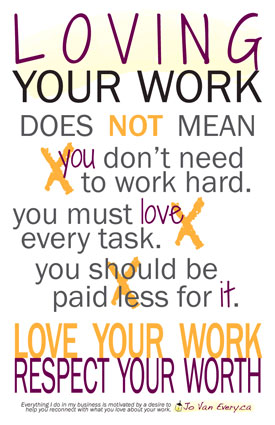
Your employer exploits the fact that you love your work (or aspects of it) to avoid addressing serious workload pressures, to avoid the cost of appropriate staffing levels, to justifying paying you less, and to avoid addressing the mental health issues that arise from those other things. You might think that the problem is with loving your work. You might also think that what defines work is that you don’t love it and maybe you need to care less.
This is not true. The problem is with the exploitation. It’s fine to love your work. That doesn’t mean you can’t identify priorities and set boundaries.
Work you love vs hard work.
Loving your work does not mean you don’t need to work hard. Work is defined by the expenditure of energy. It doesn’t have to be unpleasant to be work. It needs to expend energy.
When you love your work, you expend your energy working hard at the work. Because you are enjoying it, you aren’t wasting any energy convincing yourself to do the work or fighting your resistance to doing the work.
Remind yourself that you love this work. Remind yourself of what it is that you love about it. Focusing on what you love about your work won’t make it less hard. It will significantly reduce stress.
Setting boundaries helps you bring your best self to your work. Don’t make the mistake of working yourself to exhaustion to make the work you love feel like “hard work”.
Loving your work and the work you don’t love.
Loving your work does not mean that you love every task you must do. When you love your work, unpleasant tasks are part of a larger meaningful project, which makes them bearable. (Ask any parent who has changed a really shitty diaper.)
Remind yourself how this task will contribute to that larger meaningful project. (If there really is nothing meaningful to you about a particular task that you must do, remind yourself that getting it done will enable you to get back to the work you love.)
Set boundaries so the unpleasant tasks get done and you have time for the parts of the work that you love. Don’t make the mistake of only counting the unpleasant tasks as the “hard work”.
The value of the work you love.
Loving your work does not mean you should be paid less to do it. When you love your work, you do a better job. You work harder. You care more about the quality of the product. You provide more value.
You are being paid for the value you provide. Assert the value of your work. Asserting the value of your work may involve joining a union, or refusing to take a job that doesn’t value your work as much as you do. Sometimes the organizations you think will share your values, do not.
Related posts:
Risking doing the work you find meaningful
Juggling 101: Elements of a good plan
When you start to hate what you loved.
Prioritising meaningful work when you are feeling overwhelmed and powerless
The work you wish you didn’t have to do
This post is a combination of 3 shorter posts originally publishing in November 2014 with a new introduction.







